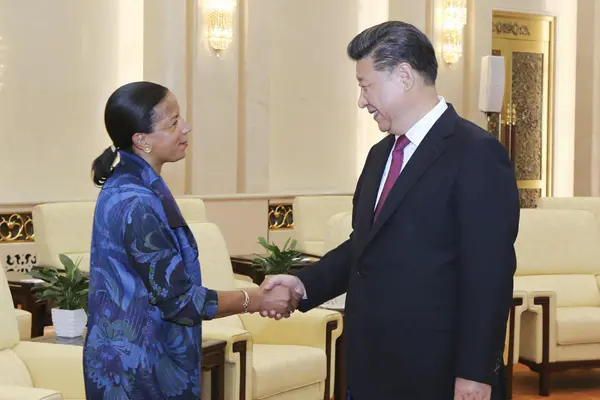As U.S. President Barack Obama's National Security Advisor Susan Rice wrapped up her visit to China on Wednesday, emphasis on cooperation from both sides sends a positive sign for bilateral ties.
Though coming hot on the heels of the South China Sea arbitration tribunal on July 12, Rice made no direct mention of the issue in her opening remarks when meeting with Chinese President Xi Jinping.
When the South China Sea arbitration tribunal issued its so-called award, the United States strongly supported the Philippines, but recently the country has walked away from the award, which has been called "a piece of waste paper" by China.
Over 70 countries and international and regional organizations have made statements showing their understanding of and support for China's position.
This speaks volumes about the attitude of the international community toward such political games and demonstrates the futility of countries trying to smear China.
The change in U.S. attitudes is related to the widespread support that China gained from the international community, as well as the willingness of the new Philippine government to hold bilateral negotiations with China.
Of course, U.S. foreign policy to China will not fundamentally change, and it is obvious that China-U.S. common interests outweigh their differences, and that the strategic value of cooperation is more important than ever before.
The U.S. should have a clear understanding that both sides need to hold firm to the general direction of bilateral ties, so that they are not affected by temporary issues.
China-U.S. ties are the most consequential bilateral relations in the world, as Rice said during her meeting with Xi. The two countries, as the world's two largest economies, cannot afford confrontations or distractions.
It is encouraging that the U.S. Secretary of State John Kerry stressed the importance of turning the page over the South China Sea dispute and initiating negotiations and talks among the claimants when meeting with the press in Manila on Wednesday.
As an outsider, it would not be a wise choice for the U.S. to poke its nose into the South China Sea issue and allow it to affect the development of bilateral ties.
Indeed, there are differences between the two countries but the key lies in the way they are handled.
Chinese State Councilor Yang Jiechi holds talks with U.S. National Security Advisor Susan Rice in Beijing, capital of China, July 25, 2016. Xinhua/Ding Haitao
When meeting with Rice on Monday, Vice Chairman of China's Central Military Commission Fan Changlong and Chinese State Councilor Yang Jiechi reiterated China's position on the South China Sea issue and the deployment of Terminal High Altitude Area Defense (THAAD) in the Republic of Korea.
The core message sent by China is that it opposes the so-called award of the South China Sea arbitration tribunal and that the THAAD deployment would undermine China-U.S. relations.
Senior Chinese officials emphasized that the two sides should manage and control their differences in a constructive way. At the same time, Rice showed her willingness to keep close communication with China to avoid misunderstanding and miscalculation.
There are many areas for the two countries to cooperate, including the economy, military, security, law enforcement, and international peace-keeping to name but a few. Pragmatic cooperation should always serve as the "ballast" in China-U.S. ties.
Bilateral cooperation has reached unprecedented levels, Rice said during her meeting with Yang, noting that cooperation between the U.S. and China in dealing with climate change, the Ebola epidemic and other global challenges was highly productive.
As the top leaders of the two countries will meet at the G20 Summit in Hangzhou in September, the world is watching closely, not only on what can be done regarding their own interests, but also on world peace and development.
During her visit, Rice promised to work with China to ensure the success of the meeting between both heads of state, as well as the upcoming G20 Summit. Such promises are a positive sign in China-U.S. relations and for the global economy.
(APD)
 简体中文
简体中文

